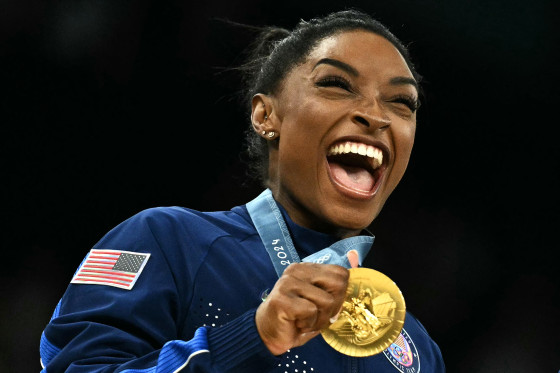Russian Gymnastics Coach Calls for Rule Change After Simone Biles’ Record-Breaking Performance
Simone Biles’ triumphant return to international gymnastics at the 2023 World Championships was nothing short of extraordinary. After a two-year hiatus from competitive gymnastics, Biles showcased her unmatched skills and resilience by clinching five medals, including four golds and one silver. This performance cemented her status as the most decorated gymnast in history, surpassing previous records with a total of 32 Olympic and World Championship medals.

The gymnastics community was abuzz with excitement as fans and fellow athletes celebrated Biles’ successful comeback. Her routines were a testament to her exceptional talent and years of dedication, blending technical prowess with a level of difficulty that set her apart from her peers. The American gymnast’s performance was widely praised for its precision, strength, and the sheer difficulty of the skills she executed, which seemed to defy the limits of the sport.
However, not everyone shared the same enthusiasm for Biles’ achievements. Valentina Rodionenko, the head coach of the Russian artistic gymnastics team, voiced stark criticism regarding Biles’ performance. In an interview with Match TV, Rodionenko expressed her dissatisfaction with the current state of gymnastics, particularly focusing on Biles’ routines. Rodionenko’s comments have stirred significant controversy within the gymnastics community and beyond.

“I want to express my regrets about Biles’ victory,” Rodionenko said. “What is gymnastics? It’s scary to watch it! Do you think there is at least some kind of aesthetic there – low? There is simply nothing to watch. She has no great performance, only difficulty. She only wins through difficulty.”
Rodionenko’s critique centers around her belief that Biles’ routines lack the artistic elements that she feels are crucial to the sport. According to Rodionenko, gymnastics should be a combination of both technical difficulty and artistic presentation. She argued that the emphasis on the complexity of moves, while impressive, overshadowed the aesthetic quality that she believes should be an integral part of the performance.
The Russian coach’s comments have sparked a broader debate about the criteria used to evaluate gymnastic performances. Many in the gymnastics community are questioning whether the current judging system appropriately balances difficulty with artistry. Rodionenko’s perspective has led to calls for potential changes in how gymnastic routines are scored and evaluated, aiming to ensure that both difficulty and artistic expression are given equal weight.
Biles’ supporters and fellow athletes have defended her, emphasizing that her achievements are a result of years of intense training and dedication. They argue that the difficulty of her routines is not only a testament to her skill but also to her ability to push the boundaries of the sport. Biles’ performances are seen as groundbreaking, with each routine showcasing new levels of complexity and execution that have set new standards in gymnastics.
The controversy surrounding Rodionenko’s comments highlights a significant division in the world of gymnastics. On one hand, there are those who view the sport as evolving, with increased difficulty and innovation pushing it forward. On the other hand, there are traditionalists who believe that preserving the artistic and aesthetic aspects of gymnastics is equally important.
The debate also underscores the broader challenges faced by the sport as it continues to evolve. As gymnasts like Biles push the boundaries of what is possible, the judging and scoring systems may need to adapt to reflect the changing nature of the sport. This could involve revising criteria to better balance difficulty with artistry, ensuring that all aspects of a gymnast’s performance are recognized and rewarded.
In response to Rodionenko’s critique, some gymnastics experts have called for a more nuanced approach to judging that could address concerns about the balance between difficulty and artistry. This might include adjusting the scoring system to provide a more comprehensive evaluation of performances, taking into account both the technical execution of moves and the overall artistic presentation.
Rodionenko’s comments have also reignited discussions about the role of international competition in shaping the sport. As gymnasts from different countries bring their unique styles and approaches to the sport, it becomes essential to have a fair and consistent system that can accommodate these variations while maintaining high standards.
In conclusion, while Simone Biles’ performance at the 2023 World Championships solidifies her legacy as one of the greatest gymnasts of all time, the criticism from Russian coach Valentina Rodionenko has sparked a crucial debate about the future direction of the sport. As gymnastics continues to evolve, finding the right balance between technical difficulty and artistic expression will be key to ensuring that the sport remains both challenging and captivating for athletes and audiences alike.





